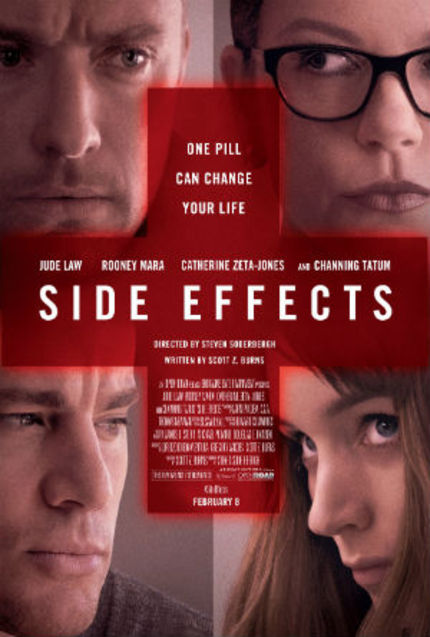Review: SIDE EFFECTS May Include Whiplash From Jarring Change In Tone

The important thing to know about Side Effects -- which Steven Soderbergh says will be his last theatrical film for a while, maybe forever -- is that whatever you're thinking it's going to be, it probably is not that. Pardon my vagueness as I avoid ruining any surprises, but what begins as a shrewd, piercing story about the pharmaceutical industry turns into something else, a different kind of story altogether. That's Soderbergh: always keeping us on our toes, even in "ordinary" genre films.
We begin with bloody footprints (an ominous sign), then jump back three months. High-finance guy Martin Taylor (Channing Tatum) is just being paroled after doing time for insider trading, and is glad to be reunited with his wife, Emily (Rooney Mara), who has barely coped without him. She suffers off and on from depression and anxiety, and though Martin is eager to regain their former financial status ("I can get us back to where we were. I promise I can make that happen"), Emily continues to struggle with day-to-day living.
She winds up seeing a psychiatrist, Dr. Jonathan Banks (Jude Law), who consults with her former doctor (Catherine Zeta-Jones) and puts her on Zoloft, followed by a newer drug that's still undergoing trials. Here we get into the nitty-gritty of the anti-depressant business, and the thorny details of how it all works. Dr. Banks is paid a hefty consultant's fee by the company to put his patients on the new pill. He discloses this fact beforehand, and exerts no pressure on patients to opt in -- but still, you can see why there are debates about the ethics of it all. And what about the potential side effects that the commercials always rattle off? Just how likely is it that the average patient will encounter any of them? How is the responsibility shared between doctor and patient? Whose fault -- if anyone's -- is it if something goes wrong?
Screenwriter Scott Z. Burns (Contagion, The Informant!) has done his homework, presenting the logistics of depression treatment realistically and compellingly. We feel slightly uneasy about the slogans and homilies Dr. Banks offers: "[The medication] makes the brain stop telling you you're sad." "It doesn't make you anything you're not, just makes it easier to be who you are." "Depression is the inability to construct a future." It all sounds so simple, doesn't it? Surely it isn't.
And then, as mentioned, the plot takes an unforeseen path, and I'll say no more about it. I enjoyed the first half of the film more than the second, but that isn't because the second half is poorly executed: it's that the type of story it tells -- Hitchcock meets Law & Order -- isn't as satisfying, to me, as the one in the first half. The lofty philosophical questions are supplanted by tawdry, down-to-earth stuff -- which is fun, too, but it can be a jarring transition. I couldn't shake the thought that the movie had gotten silly, but that's primarily only in comparison to the high-minded tone it had at the beginning. Both halves are entertaining and thrilling in their separate ways.
On the other hand, I wouldn't be at all surprised if viewers who are only half-invested at first perk up when things start twisting. As with any medication, the reactions will vary somewhat from one patient to the next. Fortunately, you're in good hands with Dr. Soderbergh. Even if you think he's screwed up, you'll probably find the mistakes interesting.
Side Effects opens wide across North America on Friday, February 8.







